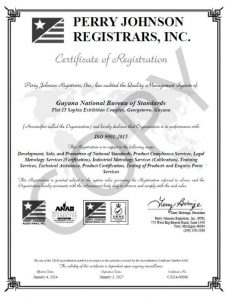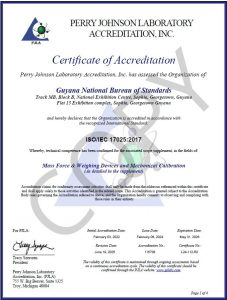Who doesn’t love a hearty plate of salted fish and bakes, or a steaming bowl of metemgee with salted fish? From breakfast tables to family gatherings, salted fish is a beloved dish woven into Guyana’s culinary traditions. To guide its production and ensure quality in every bite, the Guyana National Bureau of Standards (GNBS) developed the Guyana Standard – GYS 53:2016 – Specification for Salted Fish and Dried Salted Fish.
Adapted from the CODEX STAN 167:1989, this National Standard sets out requirements for salted and dried salted fish produced for retail and distribution for human consumption. It ensures that whether it’s added to your cook-up rice, or when making a simple sautéed dish, the salted fish you buy and use is safe, properly processed, and fit for your family’s table.
The GYS Standard applies to fish that is fully saturated with salt (heavily salted) and fish preserved by partial saturation, with a salt content not less than 12% by weight, fit for consumption without further industrial processing.
Salted fish may be produced through brining, brine injection, dry-salting, pickling, or wet-salting, and can be made from a variety of species including shark, snapper, mackerel, and catfish. Drying may be natural (open air), artificial (mechanically circulated air), or a combination of both.
To ensure a safe and high-quality product, the standard requires that fish be wholesome and fit for human consumption. Importantly, the standard considers salted fish defective if it contains foreign matter like wood chips or bird droppings, has an objectionable odour, develops halophilic mould, or shows signs of pink/reddening, textural breakdown, bruising, or burning. Such defects can affect taste, safety, and consumer preference.
Additionally, the salt used in production must be clean, uncontaminated, and free of dirt, oil, or foreign matter, and food-grade packaging materials must be used, with labels in English stating the product name (“salted fish” or “dried salted fish”), lot identification, and manufacturer’s details.
The standard also outlines hygiene, handling, storage, and transport requirements to protect the product throughout the supply chain. Sampling and analysis procedures, outlined in the standard, help determine factors such as net weight, salt content, moisture levels, toxic heavy metals, and overall quality.
Producers of salted fish are encouraged to acquire a copy of this standard and conform to its requirements which ensure a quality product for the consumer and a competitive advantage of their businesses in both local and export markets.
The GNBS will continue to develop, promote and support the implementation of food standards in our local food sector, so that Guyanese can confidently enjoy dishes made from products meeting the requirements of standards.
For more information, contact GNBS at 219-0062/65, WhatsApp 692-4627, or visit www.gnbsgy.org.






